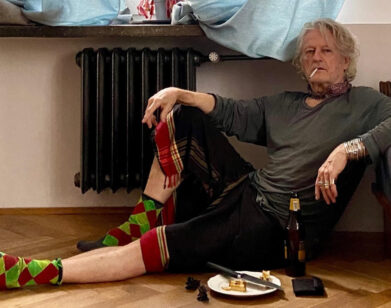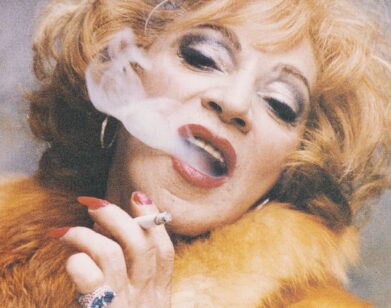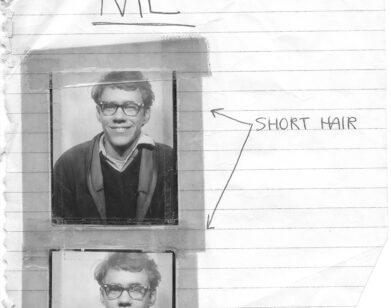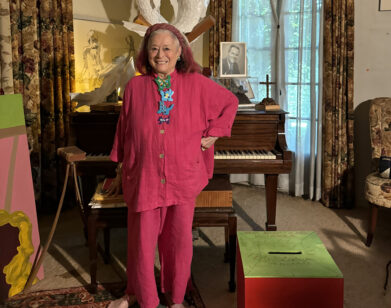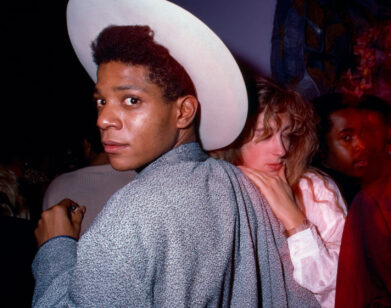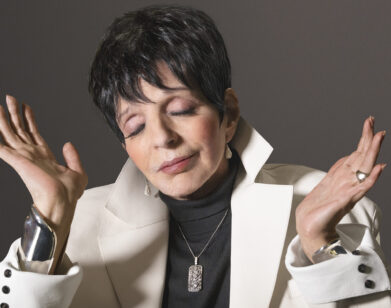XXX
“New York Isn’t Raunchy Anymore”: Christopher Makos Looks Back on the City’s Golden Age
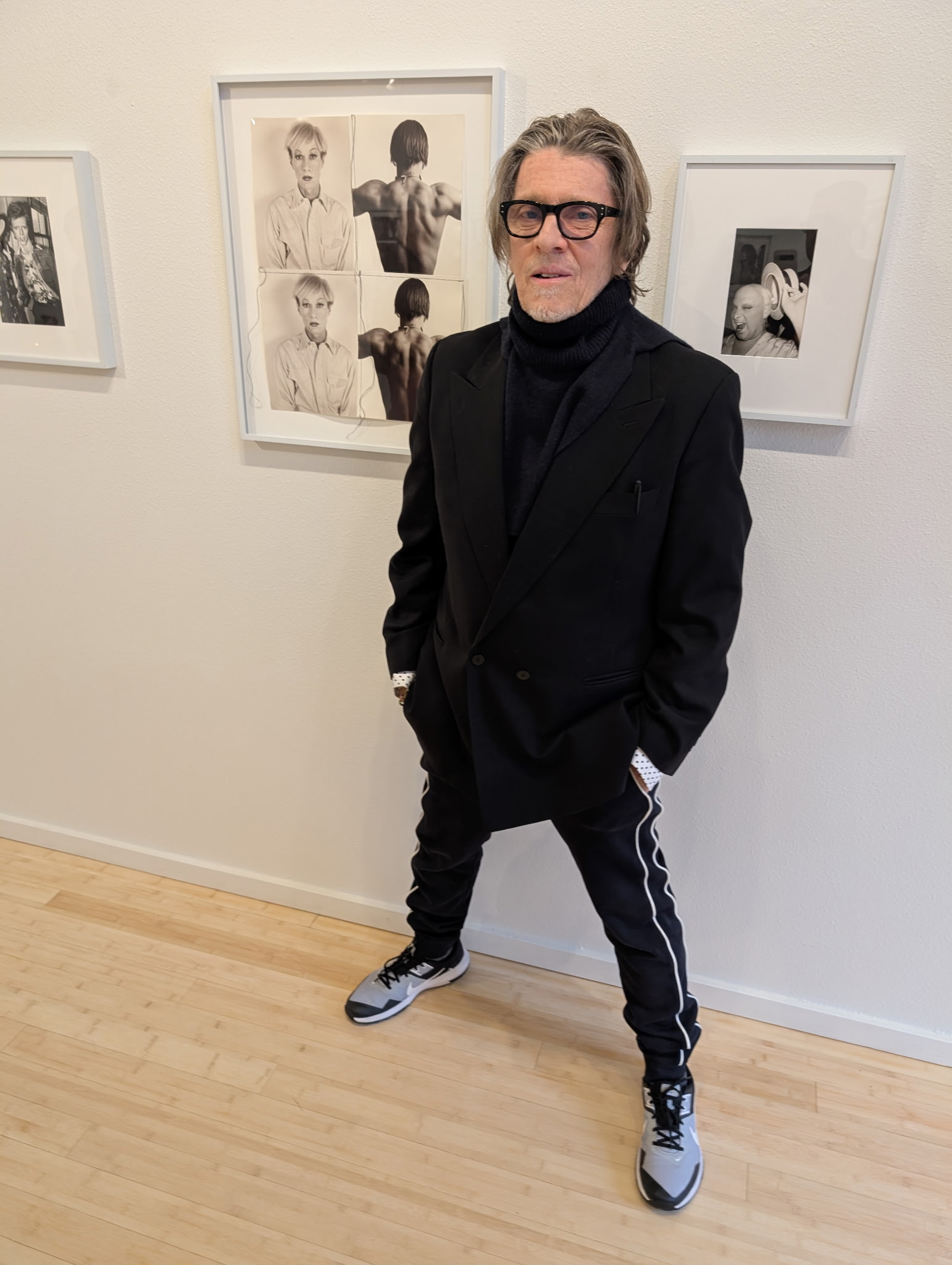
Photo courtesy of Christopher Makos and Daniel Cooney Fine Art. All other photographs by Christopher Makos.
“There were sex parties, there were drug parties, there were dance parties—it’s hard to narrow down,” remembers the photographer Christopher Makos. Upon arriving in New York City in 1976, the artist had only an apprenticeship with Man Ray under his belt and an empty Rolodex. But it wasn’t long before he leveraged his mop of golden locks and his New England charm to become the city’s party boy du jour, ingratiating himself with the colorful characters that populated Andy Warhol’s Factory. From dark nightclubs with Divine to sitting side-by-side with Calvin Klein on the Concorde, Makos has rubbed shoulders with the seediest and most sensational characters that defined the golden age of New York. Now, his photographs from that time are on view at the brand-new Sante Fe outpost of Daniel Cooney Fine Art, introducing a new generation to a bygone era that seems especially distant now. But Makos says all hope isn’t lost. “New York has really cleaned up,” he told me on a call last week. “But it’ll get funky and gritty again.”
———
MITCHELL NUGENT: Hey, Christopher. I recently saw a video that Daniel Cooney shared on Instagram, where he was talking about your vigor.
CHRISTOPHER MAKOS: Well, he talked more about me being a hustler. That’s okay. I’m okay with it all. I mean, look, if you don’t hustle, you don’t get anywhere.
NUGENT: Certainly, and I think it’s a true testament to who you are. I’ve known you for quite some time now and every room you enter you kind of command, which is a rare quality. Have you always been the life of the party?
MAKOS: At the beginning, I didn’t know I was, because I was just an outright beautiful young boy from Southern California with blue eyes and long hair and that was enough. You know what I mean? I know everybody refers to my Andy Warhol life, but there was a life before Andy and there was a life after him. It is just that those 10 years at The Factory from 1976 to 1986 were important years. I mean, those are the years that I became supersonic. I used to fly back and forth with Warhol on the Concorde. And that’s where it took my party boy level to another level.
NUGENT: Would you ever fly somewhere on the Concorde just to go to a party in another city?
MAKOS: No, not really. Andy making money was a party, you know what I mean? I mean, just getting on the Concorde was the party. I remember a couple of times going during fashion week in Paris and one seat was Calvin Klein, the other seat was the head of Perrier Jouer Champagne, It was like a flying boardroom. And everybody kind of talked to each other. I mean, I remember, you know the Perrier water? The bubbling water. Andy did a portrait of that, of which I negotiated that deal on the Concorde.
NUGENT: The mile-high club.
MAKOS: I don’t mean negotiate. We just started chatting and the head of the company said, “Would Andy like to do that?” And I said, “Of course he would.” Then everybody started to make their moves, you know what I mean? And before you know it, the caviar was finished, the champagne was done, and we were ready to land. It was that kind of lifestyle.
NUGENT: And that’s the business of partying.
MAKOS: Exactly, the business of partying.
NUGENT: This is your third exhibition with Dan Cooney. What’s it like bringing it to Santa Fe for the first time?
MAKOS: [The exhibit] could be anywhere, actually. The best part of working with Daniel Cooney is, and you know this yourself, that Daniel actually curates shows. Like all of the shows that I’ve been with him, he picked all the shows. It’s a real treat when somebody like yourself, Daniel Cooney, David Fahey, the people that I work with come and curate what we’re doing together. For me, it brings new life to these photographs.
NUGENT: It’s a really dynamic show.
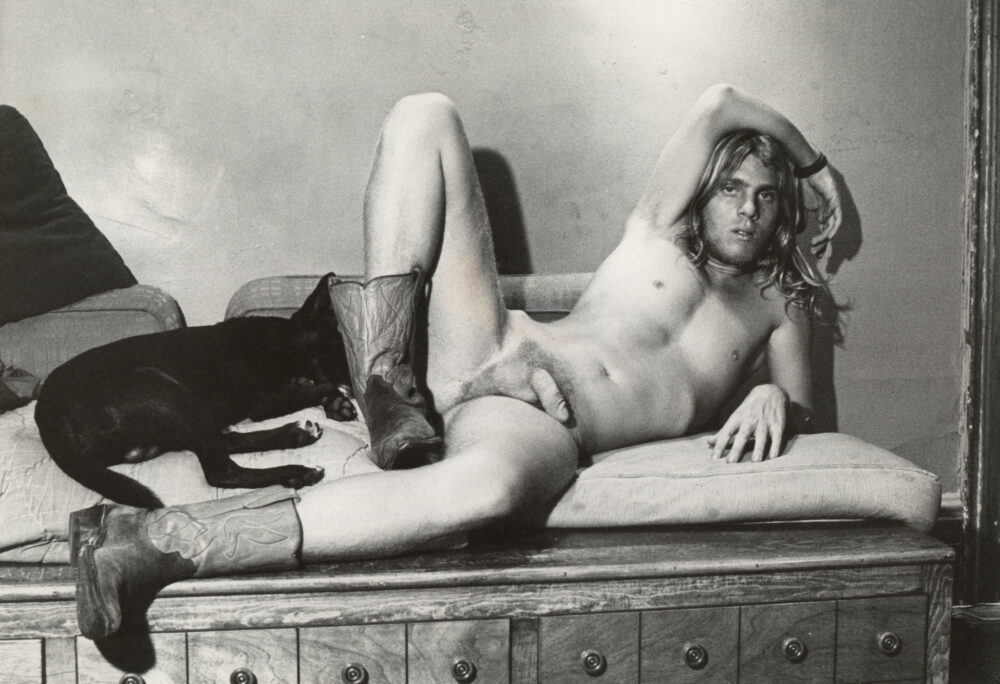
Self Portrait with Dog and Boots, 1970s
MAKOS: It makes me see stuff in a particular way that I’ve never seen them before. I mean, frankly, when I see some of these pictures of my dick, my butt, all of this stuff out there, it’s like, wow, I’m not actually doing it. I’m doing it with the tutelage and the curation of Daniel Cooney, who sees stuff in such a different way. And I think him going to Santa Fe is an absolutely cool thing because the art scene isn’t in just in one spot anymore. It seems to be everywhere. The way things are in today’s world with such uncertainty that you can always be anywhere.
NUGENT: What’s the best party you’ve ever been to?
MAKOS: God, I’ve been to so many incredible parties. There were sex parties, there were drug parties, there were dance parties—it’s hard to narrow down.
NUGENT: What would make you want to leave a party?
MAKOS: That I’ve been there long enough and I don’t want to stay myself. Or if I had hooked up with somebody at a party, that’s what would make me leave the party.
NUGENT: Thank you, next.
MAKOS: Because when you’re young at your age, once you make that hookup, you’re done. You’re on your way back to your apartment, you know what I mean? Or wherever you’re going to go.
NUGENT: Onto the next hookup, presumably.
MAKOS: Yeah, I always remember going to any kind of parties or events that we did in London, and I seemed to always hook up with somebody in London. And then much to my surprise, finding out that the Brits, they look so proper, and then you get back to my room or their place, and they are kinkier than you could ever imagine. They turn Tom of Finland on you. You know what I mean? Stuff you didn’t expect.
NUGENT: Royally filthy.
MAKOS: [Laughs] Yeah, absolutely. The proper shirt and tie comes off and there’s a harness and everything on underneath.
NUGENT: Speaking of filth, there’s this fab picture of Divine in the show. Was she as filthy at parties as she was in John Waters flicks?
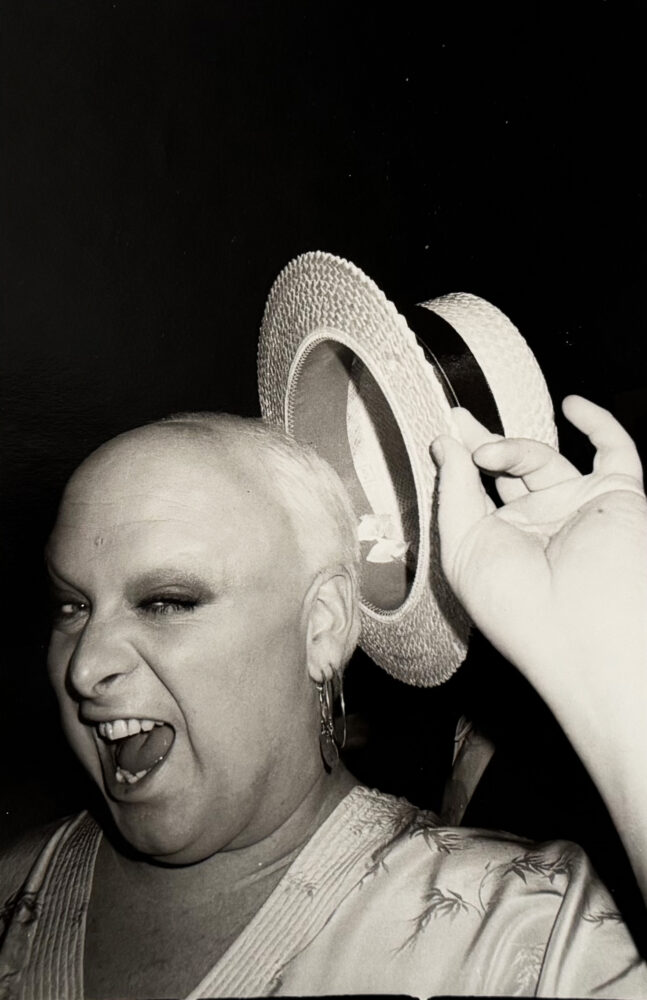
Divine, 1978
MAKOS: Absolutely not. It’s like comedians, they’re not really that funny at home. So Divine was just like a really proper person from Baltimore. I mean, when I see actors, actors, comedians and stuff, often it’s like, that’s who they are. That’s their world. But privately, it’s a much different thing, you know? Just because you give so much of that when you’re on stage or you’re performing, and so that when you’re at home, it’s such a different thing. Think of Joey Arias. I mean, what’s Joey like at home? He gives so much when he’s doing what he does. I really miss characters like Quentin Chris, Divine, and John Sex. I’m not being melancholy about it, but can you give me an example of characters that are even close to Divine [today]? It’s become so watered down. I mean, RuPaul’s Drag Race is really great and interesting, but none of them stand out in the way that Divine does. It’s putting on makeup and just outdoing each other, whereas Divine never had to outdo anybody.
NUGENT: I think someone like Divine contextually in that time period really had to create a space in the entertainment industry at a time when she wouldn’t necessarily be celebrated commercially. I believe Divine was the first drag queen to ever be on the cover of a national magazine, which was Interview’s cover in February 1988.
MAKOS: I always say that if you’re consistent and you keep doing it and you keep doing it, everybody else will fall by the wayside and you’ll be there. I’m still around. Bob Colacello is still around doing things, Vincent Fremont is still around.
NUGENT: Eric Goode is around.
MAKOS: That’s right.
NUGENT: Your generation is still carrying the torch.
MAKOS: Yeah, but I still love what I do so much. And because I don’t live in the past and I relish and look towards the future a little bit, the present is the most important thing, like what I’m doing with Daniel Cooney.
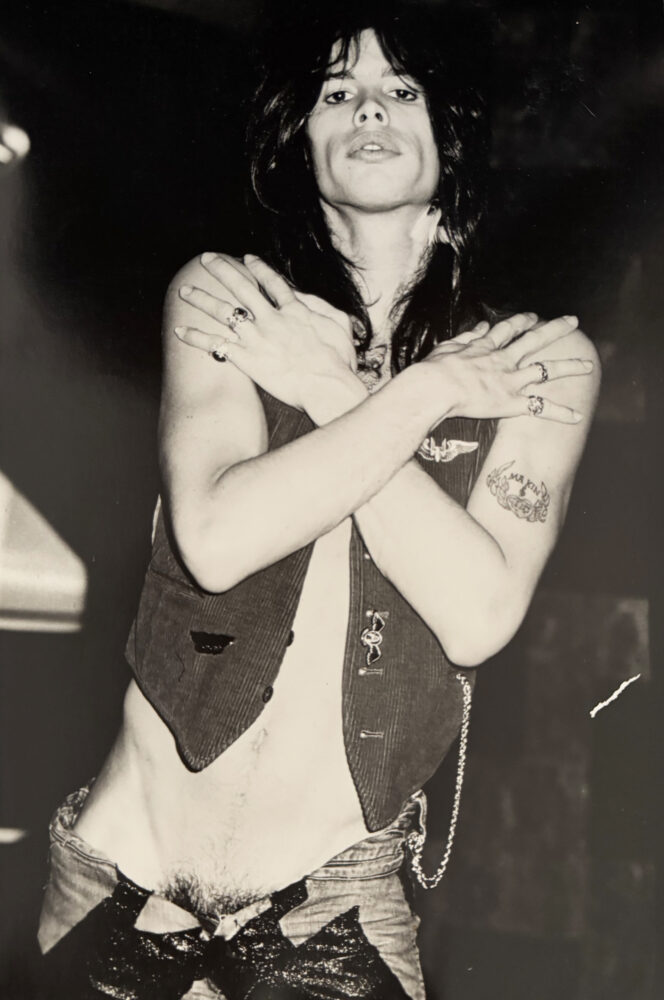
Steven Tyler, late 1970s
NUGENT: There’s this really fab photo of Steven Tyler. He just looks so glamorous and androgynous and has exposed pubes. There’s always this myth or this lore of partying with rock stars and trashing hotel rooms. Did you ever do that with Steven or any rock stars?
MAKOS: There’s that sort of mythology of that, but all rock stars and those pictures were taken kind of early-ish on his career. It’s interesting you picked that picture out because that was a controversial image. I mean, you see [pubes] on Instagram and TikTok all the time. I mean, pubes don’t get censored anymore, do they?
NUGENT: Sometimes they do if it shows too much but for the most part, I think you get away with it. You’ve been a close friend of Debbie Harry for ages and she looks so glamorous in this shot. I think once you told me about an evening you spent with her during a blackout in the 1970s.
MAKOS: Oh yeah, we had a blackout in New York City, and [Debbie and I] were hanging out in my West Village apartment and the blackout happened and we’re sitting there with like, one candle. And I have a picture of her—don’t ask me to find it because I don’t know where it is—but it’s a picture of her sitting on a sofa with the candle lighting her up. That was the really big blackout. You weren’t alive, of course, but there was one really big blackout that lasted like 48 hours, which was fun.
NUGENT: What a dream, to be trapped in an apartment with Debbie Harry.
MAKOS: I have to say, in the West Village with no streetlights, pitch black for 48 hours. People were giving blow jobs right in the West Village, not like down by the nasty area [near the Piers]. It was happening on Bank Street. It was pretty raunchy in the West Village.
NUGENT: The good old days.
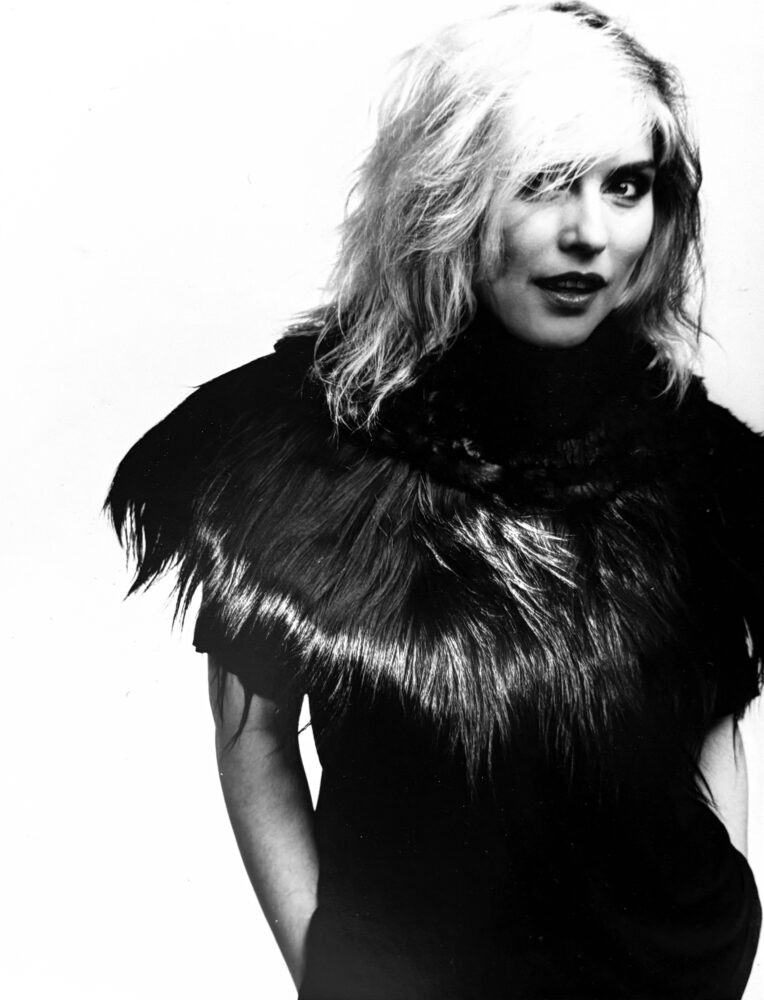
Debbie Harry, 1987
MAKOS: Exactly, that’s when the West Village was raunchy. I mean, the West Village is not raunchy anymore. New York isn’t raunchy anymore. I mean, I think Brooklyn, there is more raunchiness going on than in the city.
NUGENT: The West Village is really over. There’s that great shot of Peter Berlin on Fire Island. As you know, I’m a native Cape Cod boy and loyal to Provincetown, and I don’t fancy Fire Island. What was the energy like in the Pines back in the day?
MAKOS: I didn’t go that much, but whenever I did, somebody was giving me some drug and before you knew it I was walking around in a towel. The scene was so crazy there. I hadn’t been much because I felt it was so competitive there because you were either part of the Fire Island Pines scene or you were part of the Cherry Grove scene. It wasn’t segregated, but the space between Fire Island and Cherry Grove, there was the meat rack and somehow all those differences disappeared. I guess when it came to sex, there was no difference. But socially, I remember it was very different. I mean, Fire Island is still a party scene, isn’t it?
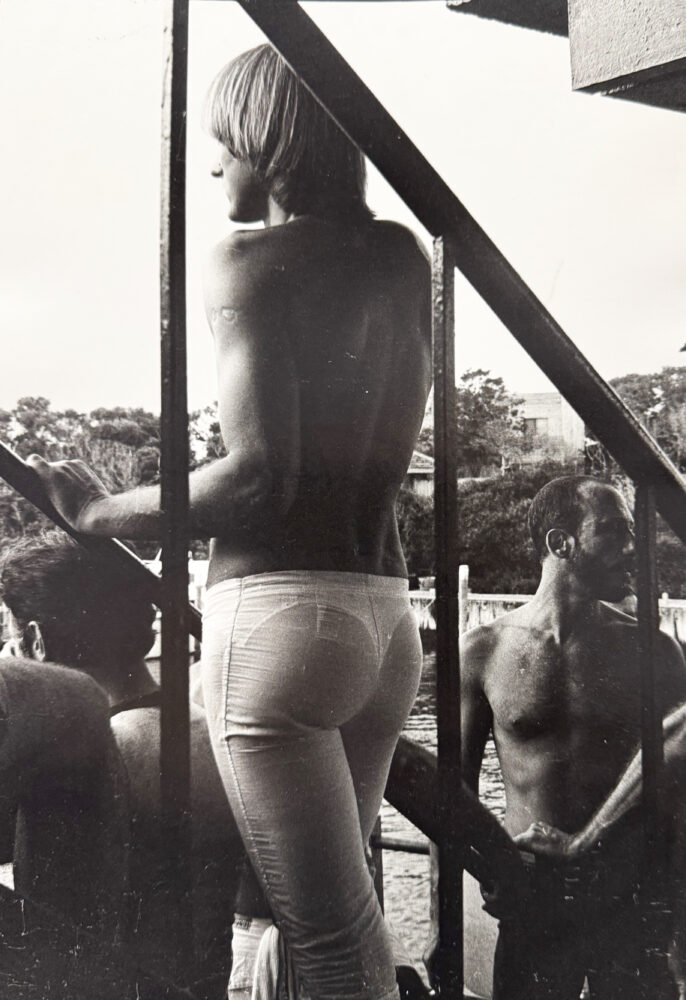
Peter Berlin, Fire Island Pines, 1970s
NUGENT: Absolutely. Speaking of sex, you put in so many nude self-portraits in this show.
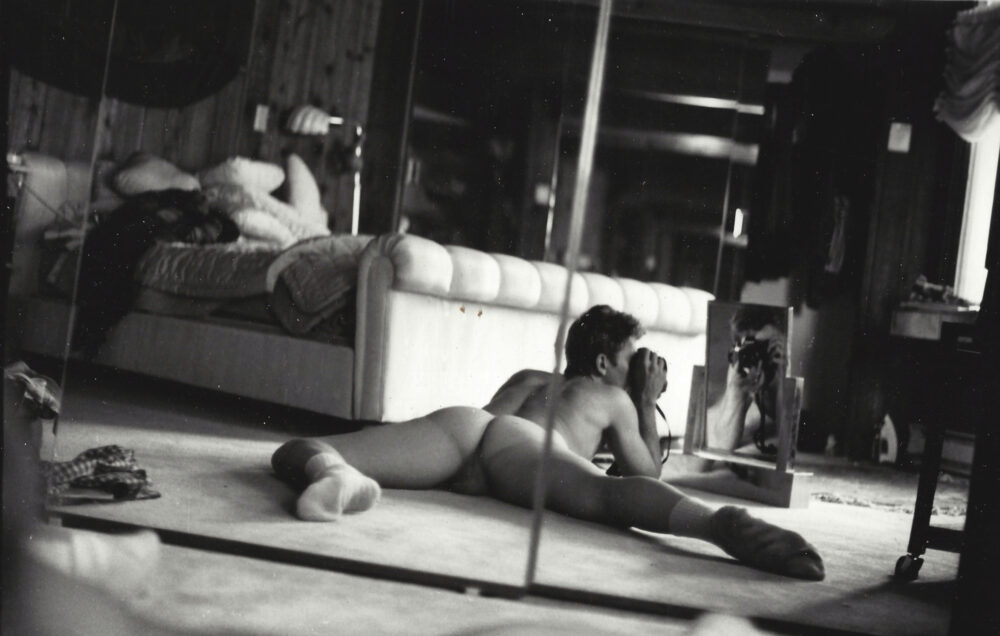
Self Portrait (Hole), 1970s
MAKOS: I didn’t do this. When it comes to that kind of stuff, I’m more shy, but of course [Daniel Cooney] really brought it out for the show. I mean those portraits, like the one of me and the dog, full-frontal with my dick hanging down, just my cowboy boots.
NUGENT: A proper cowboy. If OnlyFans was around in the 1970s, you would be a major star.
MAKOS: Yeah, I often talk about that. You know what I mean? I was thinking about maybe I could do an OnlyFans thing today with all of my classic pictures. Release a picture every once in a while…
NUGENT: Do you feel that, because you were living this more hedonistic, bohemian lifestyle, that it inspired you to feel more comfortable to pose nude?
MAKOS: Well, I remember everything was free then. I remember going to a Led Zeppelin concert and Robert Plant was so sexual on stage. His performance and that kind of heavy music and stuff. I remember I had to go home and jerk off. It got me so keyed up. I went home and I jerked off at the end of that concert because the energy level was so high. It’s sort of like New York and the whole scene here in the city, no matter what age, if you were very young or middle or whatever, the energy level was so different in the city than in America and in the world.
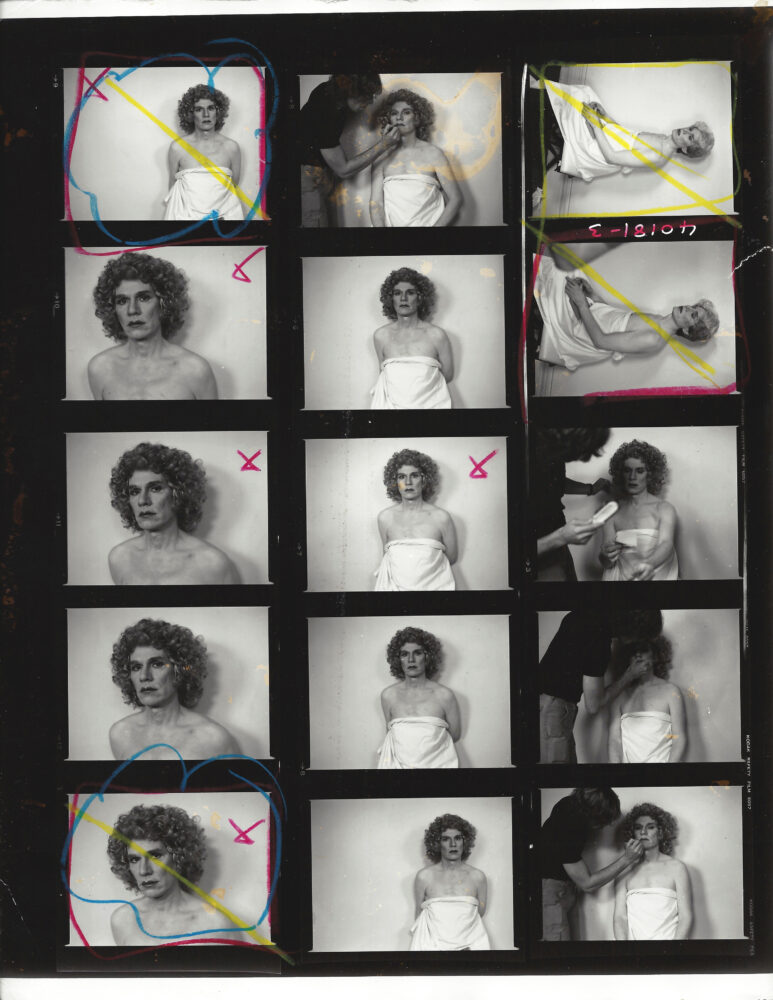
Andy In Curly Wig, Original Contact Sheet, 1981
NUGENT: We’ve talked about Warhol ad nauseam, but I’m wondering if he was dabbling in party favors? Was he not? I think it’s very clear that he was, but I’m curious if there’s a really naughty memory of him letting his hair down.
MAKOS: Andy let his hair down more in private than he did publicly because he would like to watch. He liked watching other people get high and getting silly and crazy because it depended on which part we’re talking about. At the beginning he was just taking his tape recorder around and taping everything and then he would take his little Minox and photograph the stuff. And then when I came out in the picture, we upgraded a lot of his camera stuff. So for Andy, the party was documenting the party. That’s why his book Exposures, which I directed, is one big party. You know that book, right? Exposures?
NUGENT: It’s one of my favorites. There’s such a beautiful, intimate photos of Robert Hayes, who also worked at Interview.
MAKOS: I dated Robert Hayes. I got Robert that job. I introduced him to Andy.
NUGENT: Naturally.
MAKOS: He was just the sweetest person in the world, so lovely and sexy.
NUGENT: As someone who currently works at Interview, I’m wondering what two Interview boys like yourself and Robert did after a long day at the office?
MAKOS: Go home and fuck. You know what I mean? I mean that picture didn’t come out of nowhere. You’re talking about the picture of him watching TV?
NUGENT: Yes, that one.
MAKOS: That wasn’t a fashion shoot, darling. That was the beginning of something. Or maybe it was the ending. I’m not sure. I mean, I have to tell the truth, right?
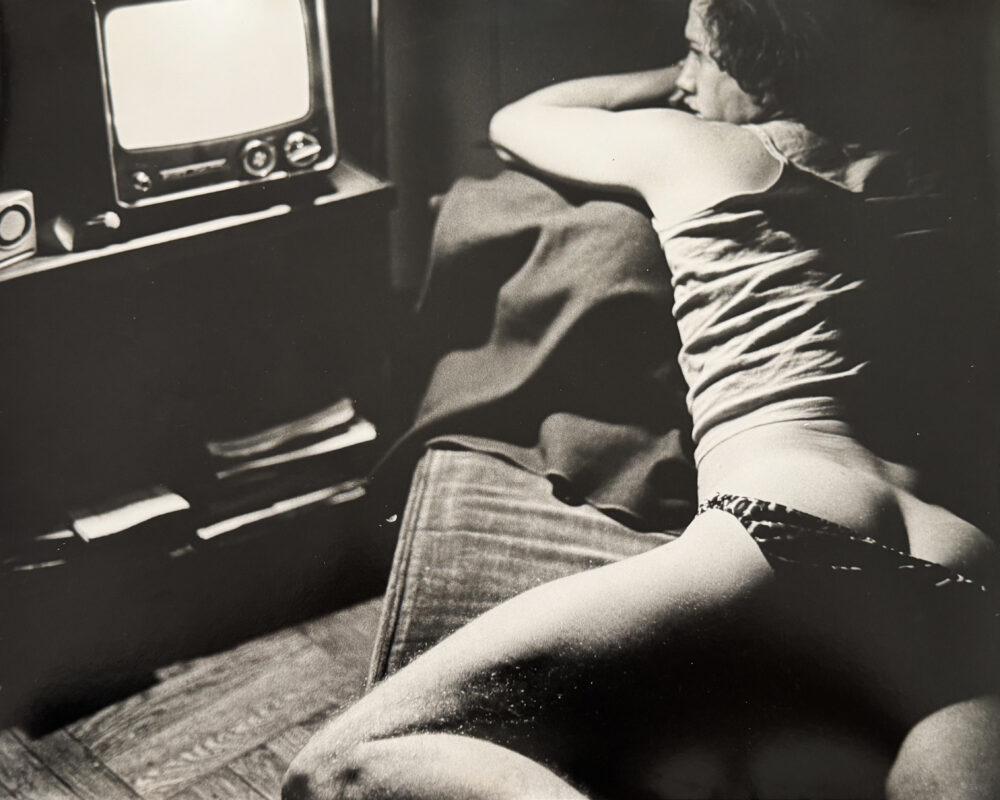
Robert Hayes, 1970s
NUGENT: I want to talk about Richard Gallo, because he’s such a legend, and that photo you have with him is incredible. Was he a good friend of yours?
MAKOS: Yeah, he was kind of in love with me. Have you ever heard his voice?
NUGENT: Never, no.
MAKOS: Oh, go research and see if you can find his voice. Robert has the quintessential Brooklyn voice. Richard had the most unbelievable Brooklyn accent. It was so over-the-top.
MITCHELL NUGENT: We’ve talked about a few of your actor boyfriends, but there’s that great picture of Tom Ligon of his backside for After Dark that’s so sexy. Men were more naturalistic back then. The late-night gay discos must have been heavenly.
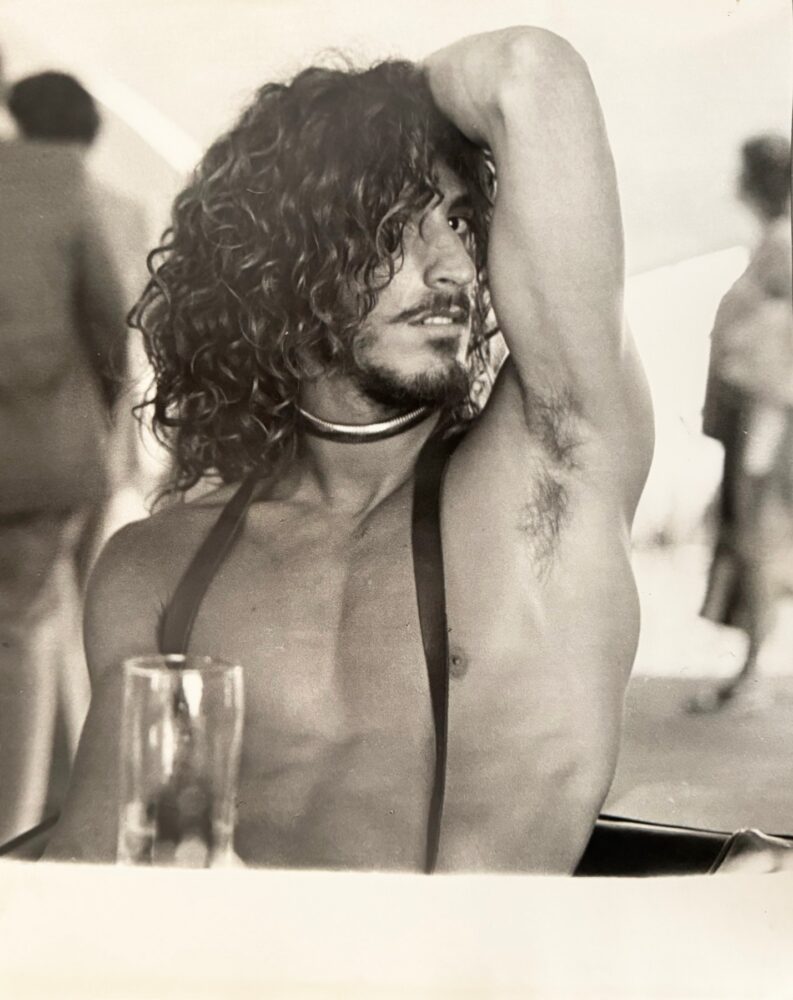
Richard Gallo, 1970s
MAKOS: Well, yeah, because today guys are so self-aware of themselves. They’ve been doing selfies and stuff. I mean, they’re at the gym, posing, taking pictures, they’re so self-aware, whereas the only time they started getting self-aware is that period when GQ and Bruce Weber and Calvin Klein were taking pictures of these guys. Everyone was much more natural, initially. That’s not the same now. I mean, so many of the people on TikTok or on Instagram, the guys are have some kind of blush on. Everybody’s eyebrows are done, but that wasn’t the case then. What you saw is what you got, and in the case of Tom Ligon, what you saw is what you got, a Caribbean balcony.
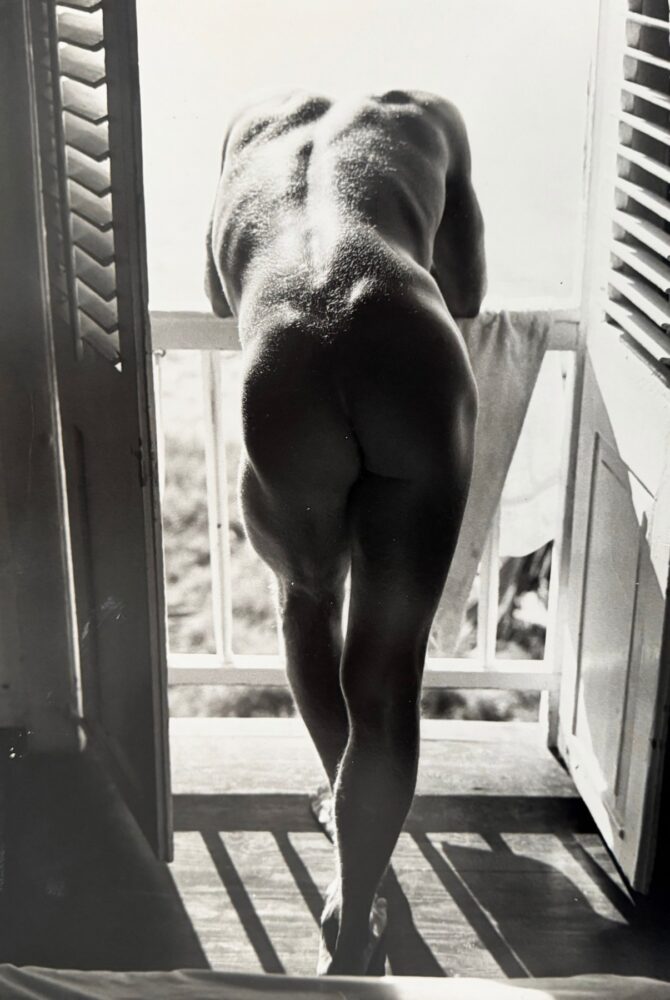
Tom Ligon, 1970s
NUGENT: Did you spend a lot of time at the Piers when you left parties late-night in New York?
MAKOS: No, the Piers were more daytime, if you can believe that. I mean, I don’t want to say just daytime, but they were daytime things. A lot of people used to go and just sunbathe. Then, I guess when you had enough sunbath, you started to get horny, so you’d walk into the area there, and there’s always somebody there dying to give you a blow job or something. It was such an unusual time. New York has really cleaned up, but with the current administration hating New York City, that will actually be really good for the city. It’ll get funky and gritty again. What will happen is we will see the rise of the artist again. You know, the arts flourish during difficult times, whether it’s the music scene, the fashion scene, the party scene.
NUGENT: Here’s hoping.
MAKOS: If things get stranger and stranger, we’ll find a new awakening. You know those fish or tadpoles that, when it’s dry, they just sort of sit and they hibernate for a long time, and then when it rains they come alive again? I’m very optimistic about what can happen in America, but specifically New York. The party will begin, and the party will start again in New York.
NUGENT: Even as a Parisian now, I’ll still admit that it’ll always be New York or nowhere.
MAKOS: We’re just two New England boys, making it happen. You know?
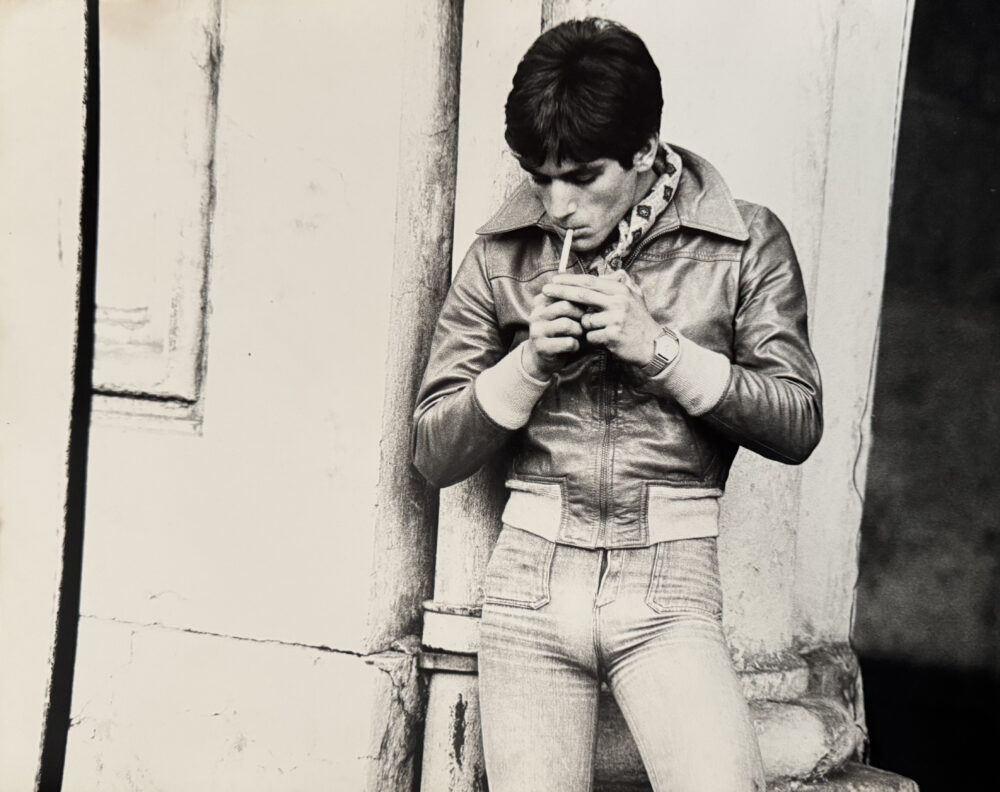
Italian Huslter, 1977

